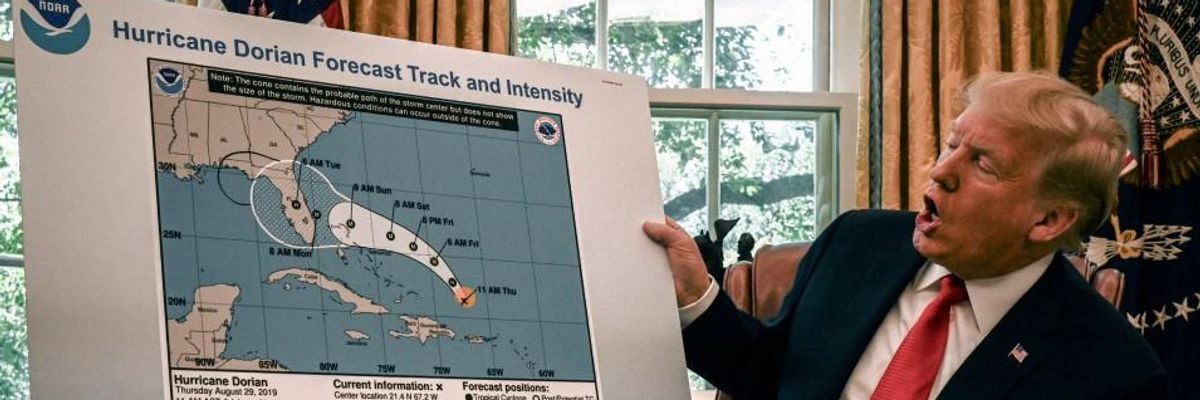It’s 2029. JD Vance has been president for six months following Donald Trump’s second term in office. You’re waking up in a storm shelter in Georgia. You cowered all night as Hurricane Don smashed its way across the state.
You open the door to utter devastation—buildings destroyed, whole communities washed away, hundreds of people dead or missing.
Despite its Category 5 strength, Hurricane Don hit the Atlantic coast with little warning. Several years earlier, following the Project 2025 blueprint, the National Oceanic and Atmospheric Administration was privatized. Hurricane hunter planes were scrapped because they were unprofitable. And satellite data was sold to the highest bidder.
Back here in the present day, just days before Election Day, we should be clear-eyed about the consequences of a second Trump term.
Without NOAA forecasts, countless people were caught unprepared. They chose not to evacuate and tried to protect their homes.
In the days and weeks that follow, you realize that the federal government is not coming to help.
In line with Project 2025, emergency response activities were transferred to state and local governments. Federal disaster preparation grants have been eliminated. And the National Flood Insurance Program was wound down, leaving only the rich and lucky few who have private insurance with the ability to rebuild.
This was the consequence of electing Donald Trump and the fruition of his Project 2025’s extreme anti-people, pro-polluter agenda.
But there was more. Following through on his campaign promise, Trump delivered an oil and gas development frenzy with more fracking, more pipelines, and a battle plan to “drill, drill, drill.”
And Trump made quick work following through on his promise to oil executives that he’d block or reverse any environmental law they wanted if they donated $1 billion to his campaign.
Between 2025 and 2028, President Trump appointed two more justices to the Supreme Court. With an 8-1 conservative hegemony, the Supreme Court ruled that the Environmental Protection Agency had no authority at all to address greenhouse gas emissions. In fact, the court rejected that climate change was even real.
As a result, all federal agencies were left unable to address any impact of climate change. Superstorms, extreme wildfires, category 5 hurricanes have become the new normal.
Back here in the present day, just days before Election Day, we should be clear-eyed about the consequences of a second Trump term.
We just saw Hurricane Milton intensify in the Gulf of Mexico at one of the fastest rates ever on record. It finally slammed into Florida as a powerful Category 3 storm, leaving at least 24 people dead, more than 3 million without power, spawning dozens of tornadoes and creating a once-in-a-thousand-year rain event.
Two weeks earlier, Hurricane Helene brought a 1,000-year rainfall event to North Carolina and Georgia. It was the deadliest storm to hit the U.S. mainland since Hurricane Katrina, leaving at least 230 people dead across six states and carving a path of destruction as much as 500 miles from any coastline.
Milton’s rapid intensification and Helene’s immense rainfall surprised some observers but both storms exemplify the effects of global heating driven primarily by digging up and burning fossil fuels.
For decades, scientists have predicted the increasing strength of such storms as governments fail to stop fossil fuel expansion and the planet keeps getting hotter. Continuing to burn ever more oil, gas, and coal means warmer oceans and warmer air. Warmer oceans provide immense energy that intensifies storms. Warming air holds more moisture, bringing heavier rainfall.
Rolling back every shred of climate progress and propping up rich polluters is going to make matters much worse for Georgia, Florida, and every other state on the Gulf and Atlantic coasts. Storms of the century will increasingly become storms of every few years—same goes for heatwaves, droughts, wildfires, and floods—with little relief or recovery in sight.
And Trump’s reckless plans to pull out of the Paris agreement again and throw sand in the gears of the international climate negotiations threatens world leaders’ long-overdue agreement last year to “transition away from fossil fuels.”
In a year of climate extremes, we’ve learned that nowhere is safe on a heating planet.
Hurricanes will keep happening, as they always have. But when you emerge after 2029’s Hurricane Don, do you want a government that acts on science to protect people and planet, making polluters pay for their destruction? Or one that sacrifices our lives and livelihoods to the highest bidder?



